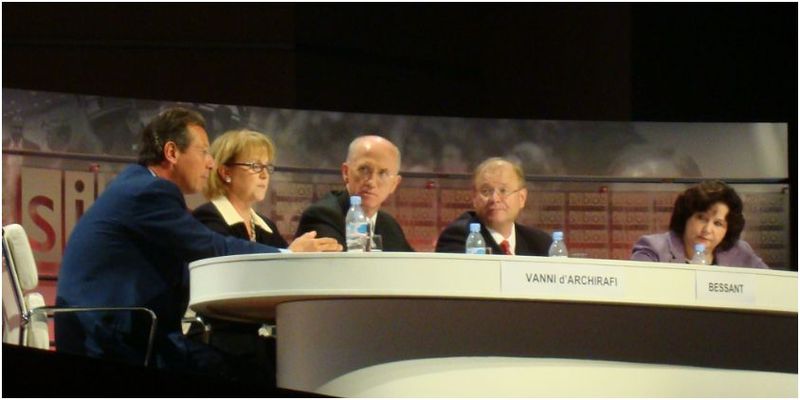
Just went to another great plenary session discussing whether transaction banking will be the engine for the next phase of sustainable growth and moderated by Karen Cone of TowerGroup. The panel consisted of the heads of global transaction banking from some of the largest banks:
- Werner Steinmuller of Deutsche Bank
- Andrew Long from HSBC
- Catherine Bessant with Bank of America
- Francesco Vanni d’Archirafi at Citi

Here’s my loose highlights of what was said and please note that these are not directly quotes but an interpretation which began with each panellist providing a view on the current regulatory environment ...
Andrew Long:
I went to the European Union to find a continent covered by regulations and thought that was bad. The recently retired chairman of our bank, Sir John Bond, said on his retirement that he joined an industry with zero regulators and there are now over 300 when he retired, and that was bad. The result is that the costs and confusion created by regulations outweigh the aims and the benefits.
Werner Steinmuller:
Regulators are always following what is happening and should be more forward looking, instead of always trying to mop up after an accident. I want to see the regulator, at least on the EU side, more coordinated. For example, we have European initiatives but no European regulator, and this would help if we had more harmonisation rather than country-to-country approaches. For example the PSD has country to country views and the cover payments initiative has no global coordination. The result is a lot of money involved in implementation.
Francesco Vanni d’Archirafi:
Just to switch the lights on we have to constantly upgrade our platform to serve our clients. Therefore business as usual, particularly with earnings pressure, will push the industry to continue to collaborate. I use scale providers when we don’t have the scale in our business and that is what others will need to do.
Andrew Long:
Regulators tend to introduce these rules and think we make so much money that it doesn’t matter, but they forget there are a lot of smaller banks that also have to comply. The costs for them are too great. This means there should be industry created platforms to support compliance with shared costs for all, rather than all the costs being applied to each institution.
Catherine Bessant:
When I think about the risks that are in the system, it is not that they are unknown to us but that they are different to those of the past: the average size of risk, the speed at which things move and how decisions are made, the costs and volumes involved. There are a lot of challenges there. The nature of counterparty identification and counterparty risk is a critical factor. Also, the places we take risk are not necessarily the places where we get paid. Daylight overdrafts for example, and the exponential risks involved there. We are not necessarily adept at educating our clients on the risks that we are taking and sometimes we are not adept at doing that internally. We have to work different ways as a result, in order to get value out of the system. This is why the notion around cooperation and leveraging scale and partnership within the industry makes sense.
Andrew Long:
We are all paid to take risks and if we didn’t, we wouldn’t be in business. In the securities space are massive risks hidden away. We are now talking about how we manage risk on an individual and systemic basis. There are significant intraday risks in there and we need consider these and price them accordingly.
Francesco Vanni d’Archirafi:
Everything we do is focused upon releasing working capital for our clients. The more you can squeeze cash from working capital, the more efficient our clients can be. This means we need to give visibility and transparency for our clients and allow them to manage risk on their balance sheet and transaction flows based upon that visibility and transparency to give them more control.
Catherine Bessant:
We, as bankers, have a duty to our clients to provide a window into the marketplace because we understand the functioning of the marketplace. We have a track on global trade flows and trade movements and, as capable as we are, we must step up our accountability to this so that our clients know as much as we do about those flows.
Andrew Long:
We will have to do more in responding to regulators and making sure our internal controls are in place. That means more costs as this is not just the risks we are aware of historically, but now legal risks and fiduciary risks and more. We’ll need to spend a lot of time on the legal documentation in the securities business for example.
Werner Steinmuller:
Compared to other areas in banking, we work much more together in transaction services, where our biggest competitors may also be our biggest clients. Without working together, payments would not work. For example, without SWIFT, we couldn’t do what we do. This is why, during the crisis, you didn’t hear about issues in the infrastructure and how the systems work or any failure in payments or settlement. BAFT is also following our interests and we are talking about how we can standardise the processes more and work together more. Sharing information on fraud protection for example, and also in the area of having a common voice to the regulator.
Francesco Vanni d’Archirafi:
We work together more because forcing people to stay with you because it’s difficult to unplug is the model of the past. This is why most banks will consider using shared services outsourcing from a competitor’s transaction services structure in the future for this reason.
Catherine Bessant
We’ve spent a lot of time working out where is the moment of separation where we need to compete and where is the moment to leverage where the scale and operation of working together can achieve more than competing. We have a joint venture with Wells Fargo in this space called Pariter** for example. The reaction to this announcement has been evidence of what an unnatural act this collaborative competition is. There were very negative reactions from some, including the Federal Reserve, about how that impacts the traditional ways we have done business. We have a lot of structures trying to craft cooperation now though, and the crisis has brought us to a moment where we have realised how we can work better together.
Francesco Vanni d’Archirafi:
The market forces us to do this, not just the regulators.
Andrew Long:
We are also seeing global changes in trade trends – the north-south trade flow is declining but the south-south emerging markets dealings are growing. There are huge opportunities here in Asia and once we work out how to leverage those opportunities through the right products in the right systems, we will be far more competitive as I’m sure my competitors are thinking today. If you introduce new products priced appropriately and have a good balance sheet, then you can grow your business by leveraging your strengths ... but you must know what those strengths are.
Catherine Bessant:
The value we get paid for the business that we do has not just reduced in the last two years, but in the last ten. There’s a painful truth about the economics of our business.
Andrew Long:
The regulators now recognise how systemically important our service is in trade flow and commerce globally, and are now asking: if we are so systemically important are we too big to fail? The answer to that is to ensure capital is covered and therefore this is why capital flow and analysi
s has been a key.
Werner Steinmuller:
Also, if a provider should fail, there should be no issue in moving their service to another. That’s the basis of open connectivity today. On another note thought, in Europe, I have two messages for the regulator on SEPA.
First, come up with an end-date
Second, harmonisation. If you have one SEPA Direct Debit, but each country with a different implementation then you don’t have a single direct debit for Europe, and this is crucial for SEPA. If we are not strict on harmonisation then the total SEPA introduction is at risk.
Note: this is what Weiner said in the research note on PSD and SEPA we released last week
Francesco Vanni d’Archirafi:
I agree and we also need to ensure the end-date is not too far out. A date please and the sooner the better in our view.
Werner Steinmuller:
2012 would be ideal, but 2013 is realistic.
Andrew Long:
I disagree. We don’t have an end-date it’s because there’s no client demand. So my message would be make SEPA and the PSD more relevant and get the markets – corporates and citizens and countries – to see it as necessary. They see it as driven by politicians however, and not as relevant.
Francesco Vanni d’Archirafi:
If we look at the European securities space, MiFID and T2S are creating major headaches for many of us around the table, and these programs have irrevocably squeezed profit pools from the trading environment. I think that’s good for Europe though as we have new business models and efficiencies delivered as a result. This is what SEPA should achieve in the future – more efficiencies through new business models.
Andrew Long:
I don’t disagree that we need efficient infrastructure but I take the view that rather than making the rules and then forcing the market to follow we should understand what the market needs and then make the rules.
** Wells Fargo and Bank of America have announced the formation of a joint venture to operate a single, combined automated clearinghouse (ACH) platform for both companies and their clients. The new entity, called Pariter Solutions LLC, will be the country's largest processor of ACH payments.
Chris M Skinner
Chris Skinner is best known as an independent commentator on the financial markets through his blog, TheFinanser.com, as author of the bestselling book Digital Bank, and Chair of the European networking forum the Financial Services Club. He has been voted one of the most influential people in banking by The Financial Brand (as well as one of the best blogs), a FinTech Titan (Next Bank), one of the Fintech Leaders you need to follow (City AM, Deluxe and Jax Finance), as well as one of the Top 40 most influential people in financial technology by the Wall Street Journal's Financial News. To learn more click here...


